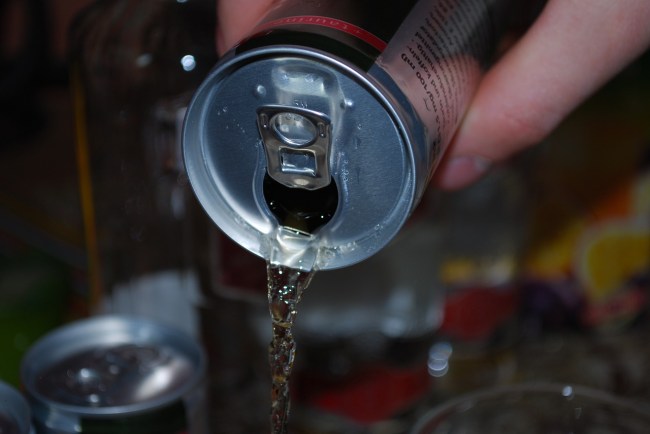Do you enjoy an energy drink for a quick boost during work or with your vodka when you’re partying hard? You may want to read this new study that outlines what energy drinks do to your body, specifically your heart.
Researchers conducted a controlled study of the effects of energy drinks on the heart and blood pressure. The study was published in the Journal of the American Heart Association and it shows some alarming discoveries of potential dangers.
The study found that drinking an energy drink in a short time span can increase blood pressure and the risk of electrical disturbances in the heart. The study is a small sample size of 34 healthy participants ranging from 18 to 40 years in age, but is one of the few controlled studies of the effects of energy drinks on the human body. Participants were given 32 ounces of energy drinks or a placebo beverage over the course of an hour.
The energy drinks included between 304 to 320 milligrams of caffeine per 32 fluid ounces as well as supplements such as guarana, L-carnitine, taurine, glucuronolactone, amino acids and Vitamin B. Your heart and cardiovascular system could react adversely to the caffeine combined with the other ingredients and high sugar content.
The study used electrocardiograms to measure the electrical activity of the participants’ hearts every 30 minutes for four hours, plus monitored their blood pressure. The scientists found that there were electrical changes, which signal the heart’s chambers squeezing and relaxing.
They found that energy drinks increased blood pressure, raised stress levels, mildly changed the heart’s electrical activity and made the blood a little bit thicker. The study found a significant 4 to 5 mm Hg increase in systolic and diastolic blood pressure in the energy drink drinkers.
Caffeinated beverages can affect the arteries by inhibiting them from dilating properly, especially during exercise. “The blood vessels in the heart during exercise have to get larger; they dilate and get larger so that more blood flow can get to the heart,” said Dr. John Higgins, a sports cardiologist with McGovern Medical School at the University of Texas Health Science Center in Houston.
“In participants who consumed either type of energy drink, researchers found that the QT interval was 6 milliseconds or 7.7 milliseconds higher at 4 hours compared to placebo drinkers,” the American Heart Association noted. “The QT interval is a measurement of the time it takes ventricles in the heart (the lower chambers) to prepare to generate a beat again. If this time interval is either too short or too long, it can cause the heart to beat abnormally. The resulting arrhythmia can be life-threatening.”
The researchers discovered a distinct difference between the caffeine in energy drinks compared to other sources of caffeine such as coffee.
“We found an association between consuming energy drinks and changes in QT intervals and blood pressure that cannot be attributed to caffeine. We urgently need to investigate the particular ingredient or combination of ingredients in different types of energy drinks that might explain the findings seen in our clinical trial,” said lead author Sachin A. Shah, Pharm.D., a professor of pharmacy at the Thomas J. Long School of Pharmacy and Health Sciences at the University of the Pacific in Stockton, California.
Dr. Shah, warned about the dangers of energy drinks and noted that people using certain medications or those with certain heart conditions could be at an increased risk of irregular heartbeat or even a fatal arrhythmia.
“Energy drinks are readily accessible and commonly consumed by a large number of teens and young adults, including college students,” said study co-author Kate O’Dell, Pharm.D., professor of pharmacy and director of experiential programs at the Thomas J. Long School of Pharmacy and Health Sciences. “Understanding how these drinks affect the heart is extremely important.”
RELATED: Energy Drink Banned After It Was Found To Contain Viagra
Energy drinks don’t just affect your heart, they also affect your brain and the rest of your body. Studies have found that 200 milligrams or more of caffeine can cause caffeine intoxication according to a paper published in the International Journal of Health Sciences in 2015. Symptoms of caffeine intoxication include anxiety, insomnia, gastrointestinal irritation, muscle twitching, restlessness, and periods of inexhaustibility.
“Unlike drugs, supplements and consumer products do not necessarily get tested for safety,” Shah said.
The World Health Organization warned that energy drinks “may pose danger to public health.” The American Academy of Pediatrics said children “should not consume” them.
The energy drink industry is only growing, it was worth $39 billion in 2013 and is expected to reach $61 billion by 2021. Approximately, 30 percent of American teenagers between the ages of 12 and 17 consume energy drinks on a regular basis.
[CNN]
